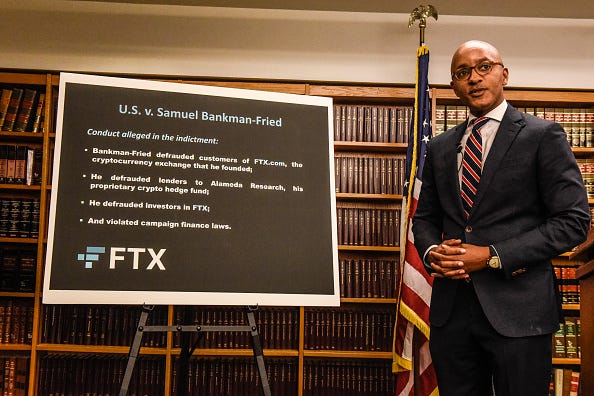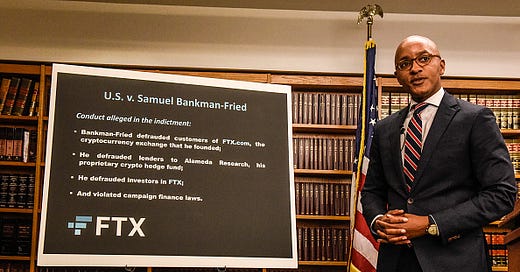Judicial Notice (12.17.22): FTX, SBF, WTF?
Chief Judge Pryor speaks candidly with a critic, Jones Day does Jones Day, and other legal news from the week that was.

Welcome to Original Jurisdiction, the latest legal publication by me, David Lat. You can learn more about Original Jurisdiction by reading its About page, and you can email me at davidlat@substack.com. This is a reader-supported publication; you can subscribe by clicking on the button below. Thanks!
Hello, hello? Is this thing on? Is anybody out there?
I’m guessing that many folks have already checked out for the holidays—and I’m not complaining, since I’m about to join them. We’re leaving soon for a few weeks with my extended family in the Philippines—my first visit since 2017, Zach’s first since 2010, and Harlan’s first ever—and I’m not sure how much I’ll be writing while away. So Original Jurisdiction might be going on a little hiatus (or at least a reduced-publication schedule) until January 9.
But I’m not gone just yet, so let’s turn to the news of the week—dominated by developments related to FTX, the bankrupt cryptocurrency exchange, and Sam Bankman-Fried (“SBF”), its potentially felonious founder.
Lawyer of the Week: Damian Williams.
Different U.S. Attorneys for the Southern District of New York (S.D.N.Y.) have different legacies. Some become famous for cracking down on organized crime. Some garner headlines for cleaning up Wall Street. And Damian Williams, 42, could go down in history as the “crypto cop.”
On Monday, SBF was arrested in the Bahamas on criminal charges brought by Williams and his S.D.N.Y. colleagues. The 13-page, eight-count indictment alleges securities fraud, wire fraud, and conspiracy involving money-laundering and campaign-finance violations. Cryptocurrency might be novel and complicated, but the allegations in the indictment describe surprisingly simple schemes to defraud customers and lenders—which FTX’s new CEO, John J. Ray III, characterized as “old-fashioned embezzlement.” One report even claims that SBF participated in a Signal group chat nicknamed “Wirefraud,” which doesn’t smack of sophistication (but note that SBF denies this allegation).
Although they don’t appear to be the focus on any criminal inquiries, SBF’s parents—two eminent academics and longtime members of the Stanford Law faculty, Professors Joseph Bankman and Barbara Fried—are under media scrutiny as well. Articles in the New York Times and Wall Street Journal profiled the couple and the role they played in their son’s rise and fall, from encouraging his interest in “effective altruism” to helping him find legal counsel (and pay his legal bills).
Thus far, SBF is the only FTX executive to be criminally charged, but stay tuned. The contents of the indictment, which allege that SBF conspired with others, along with the speed with which charges were brought against him, have led observers to suspect that some of FTX’s former colleagues are cooperating against him, which could result in them ultimately pleading to reduced charges. As Damian Williams warned in his Tuesday news conference about the indictment, “This is our first public announcement, but it will not be our last.”
In fact, we had to wait only a few days for more crypto-crime news from the Southern District. On Friday, Karl Greenwood, who sold a fake cryptocurrency called OneCoin, pleaded guilty to fraud and money-laundering charges. Greenwood founded OneCoin together with Ruja Ignatova aka the “Cryptoqueen,” who remains a fugitive (and the only woman on the FBI’s Ten Most-Wanted List). As Williams put it, Greenwood’s guilty plea “caps a week at S.D.N.Y. that sends a clear message that we are coming after all those who seek to exploit the cryptocurrency ecosystem through fraud.”
In memoriam: Jay Goldberg, a colorful courtroom character known for representing boldface names (like Donald Trump in his divorce from Ivana), passed away at 89. Goldberg’s New York Times obituary is a fun read. May he rest in peace.
Judge of the Week: Chief Judge William H. Pryor Jr.
Chief Judge Bill Pryor (11th Cir.) has been dominating these pages in recent weeks, writing the en banc ruling in United States v. Garcon, which deepened a circuit split on an important interpretive issue about the First Step Act, and serving on the panel in Trump v. United States, which told Judge Aileen Cannon of Mar-a-Lago infamy to just stop, please. And now he’s Judge of the Week, since he got talked about quite a bit over the past few days—although this time not for any judicial opinions.
Keep reading with a 7-day free trial
Subscribe to Original Jurisdiction to keep reading this post and get 7 days of free access to the full post archives.



